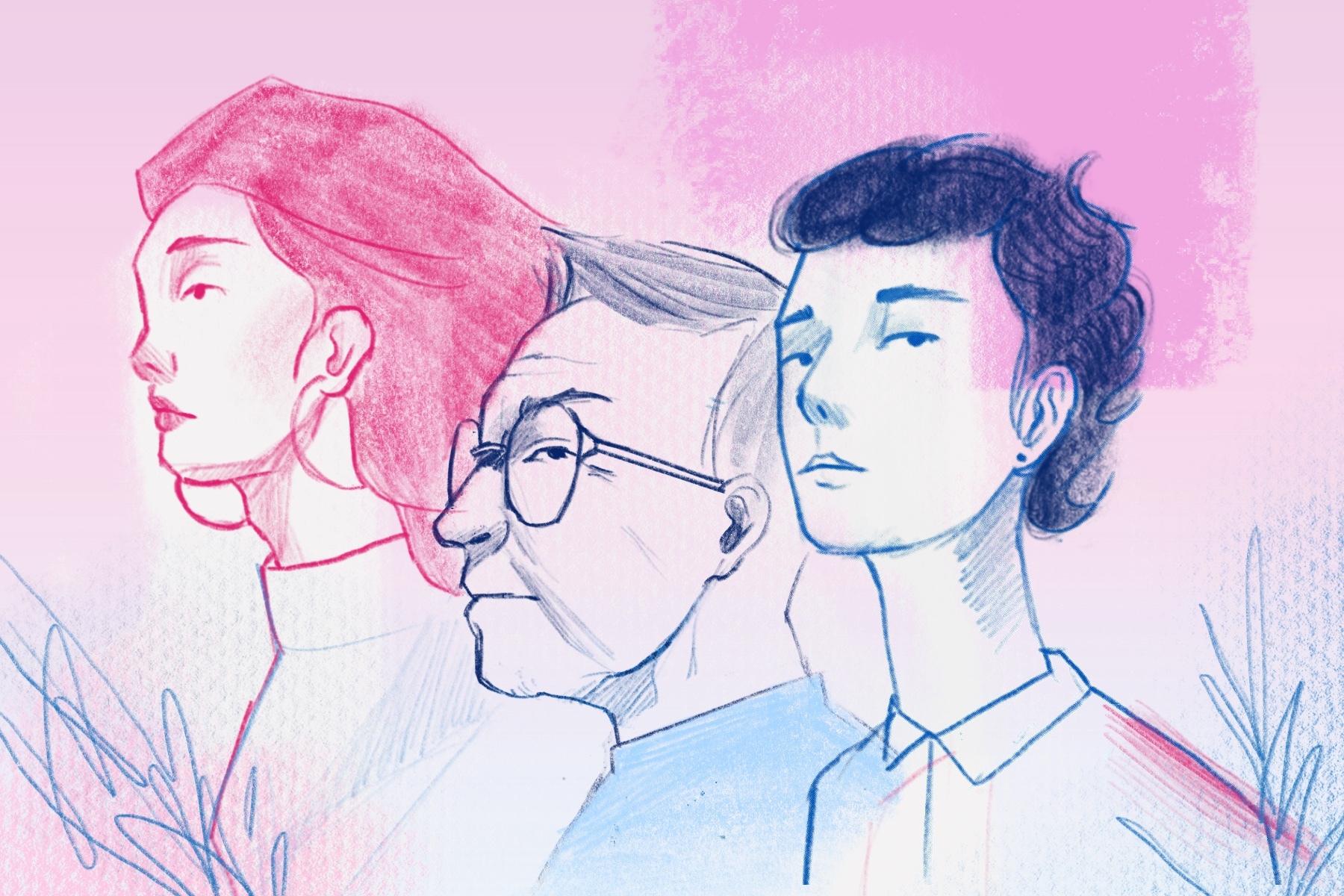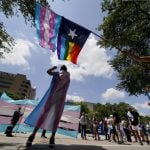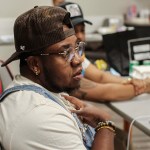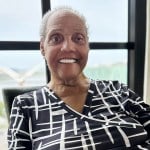This Pride Month, we’re telling the untold stories of LGBTQ+ people. Subscribe to our daily newsletter.
When trans people meet each other and swap stories, an integral part of finding survival and hope unfolds within the community. This can be even more poignant when experiences are shared across generations.
The 19th interviewed six trans people who live hundreds of miles away from each other, across three different generations — members of Gen Z, Gen X and Boomers — about their lives, their fears and where they find hope. Three of them say writing has helped them find strength and pride in an unprecedented time of fear. Others say that music, and learning from their younger counterparts in the trans community, has brought them solace and self-discovery.
Andrea Montanez believes that younger transgender people are the real energy of the current fight for trans rights. When she meets them, especially those protesting at Florida’s state capitol, she feels a special joy from that connection — and like they look up to her as one of the “old warriors.”
Montanez, 57, lives in Orlando and leads LGBTQ immigration services with Hope Community Center, as well as other local events. She came to the United States from Colombia 25 years ago, seeking safety from drug cartels after working as a federal agent in undercover narcotics.
Pride Month: Resistance, resilience, recreation and rest
This story is part of our Pride Month coverage. From lived experiences to in-depth Q&As and survey data, we’re focused on telling stories highlighting themes that reflect the complexity of emotions elicited by this moment in time. Explore our work.
The strength of the younger generation is a large part of why Montanez shows up to advocate for her community at the capitol in Tallahassee, in the midst of Florida’s campaign against trans people. She recognizes the looks on some of the faces in the younger crowd.
“It’s like a hope that they’re going to be also adults, and old as one,” she said. “It’s an amazing feeling for both generations.”
Jade Duckworth plays the drums. They love music — especially hardcore, post-punk and metal. They spend the school year participating in marching band in Petal, Mississippi. Band camp is a much-awaited part of summer. Music gives them relief, and helps them cope, as they watch trans and nonbinary kids like themself become political targets.
Duckworth, who is 15 and nonbinary, felt enraged as they watched Mississippi ban gender-affirming care for minors. They are not sure if they personally want to take the treatments yet, but people in their life are being hurt by being kept from accessing care. After watching Republicans testify in favor of the bill — and seeing one proponent equate transition to defying God’s will — Duckworth had to process their feelings by writing down lyrics.
“It fuels my rage,” they said. The lyrics reference the high percentages of transgender people who have contemplated or attempted suicide — and the fact that people don’t feel safe, because of this. One section of their song says: “Do something with your life. Live a little bit. Learn how to accept change. The life isn’t yours to take away.”
“You’ve had your chances, but it’s running thin. Tensions are growing higher and higher. If you don’t do something, the powder keg is gonna be lit.” While writing the song, Duckworth was also thinking of Brianna Ghey — a 16-year-old transgender girl who was killed by other teenagers in an English village.
Reading the news about what’s happening to trans people is hard, but Duckworth finds some empowerment in it.
“It’s just one more thing that we need to stand up against … in making sure that stuff like this doesn’t continue. At some point, [we need] to stop the wave of hate towards trans and gender nonconforming people.”
When I see people who are older, who have experienced more, in my shoes, it makes me feel so happy.
Jade Duckworth
For Duckworth, it’s rare to talk with a trans person that’s older than they are — or someone in the community who just has more experience. It feels like a spark of hope when it happens.
“When I see people who are older, who have experienced more, in my shoes, it makes me feel so happy. Because if they’ve been through it, and they’re able to pull through, what does that mean for me? That means I can do the same. I just have to remember to not take everything to heart — to not get hurt,” they said.
On July 14, 2015, Rene Melendec had an important message to write to herself, too.
“I think I am a trans woman,” the note reads. That moment was the first time she knew what it felt like to love herself. From that day on, she decided she wouldn’t allow anyone in her life to abuse her or take advantage of her. She wanted those in her life to have her best interests at heart.
Melendec, now 62, has been living as her true self full-time for six years — and spent Transgender Day of Visibility this year with her sister in New York City, where she’s always made her home.
“I didn’t have the strength to write, ‘I am transgender.’ But I knew that I was. So thank goodness that I had enough knowledge in my head to know, I need to speak to someone about this,” she said. Melendec found someone to talk to at a local LGBTQ+ center and got a referral to start gender-affirming care.
I’m really proud of the woman that I am.
Rene Melendec
“This was the scariest thing in the world for me,” she said. It was difficult to think about what her life would be like after everything changed, and after she was 50 years old — but she knew that she had to do something to really live, for the first time she could remember.
Now, she’s grateful that she took the leap. Her life is calmer now, she feels in tune with her emotions — and feels stronger.
“I’m really proud of the woman that I am,” she said.
Elizabeth Knight has written many poems. Her favorite is called “I am Proud” — one she wrote in late 2021 with the help of her mentor, Taria Person, a trans spoken-word poet based in Nashville. The poem finds that the more knowledge Knight gains of herself, her labels and her identities, the more powerful she becomes.
“I am proud of my identity, which is mine and mine alone,
Noone can label me, though they wish to table the unknown.
Noone can take me solely for their own.
I know that only love in abundance can be grown.”
Knight, an 18-year-old trans woman who lives in Montgomery County, Tennessee, looks up to Person because of their assuredness in who they are. Knight has always felt a little more reserved, but Person — an adult and published author — has helped her to step out of her comfort zone when it comes to writing and sharing poetry.
Knight attends Person’s writing workshops each summer, and the two often collaborate through Southern Word, a youth-focused literacy organization. She wants to keep writing, because poetry helps her air out her feelings, and to find a place to reflect on intrusive thoughts or situations that she doesn’t want to share with anyone else. In the past, Person has been one of the few people that Knight has ever talked to about the content of her writing.
It’s good to see that being trans is a generational thing, that it’s continuous.
Elizabeth Knight
Person is the older trans person that Knight looks up to the most. Part of what makes those kinds of relationships special is that, despite generational and cultural differences, being trans is a shared bond — and a shared community, she said.
“It’s good to see that being trans is a generational thing, that it’s continuous. It also gives me hope that I could be an older trans person one day,” she said. “It still feels like older trans people belong and younger trans people belong in those shared trans spaces.”
Kylar Broadus, founder of the Trans People of Color Coalition, comes from a generation that wasn’t able to find trans mentors, he said. Broadus, who is turning 60 in August, remembers his generation as one that worked to create trans visibility — which meant that elders were largely hard to find.
Broadus found Billy Tipton — the celebrated American jazz musician who lived as a man and was outed as transgender after his death — in the tabloids when he was a kid. He held onto Tipton’s story as proof that he wasn’t losing his mind.
“He sang to me in a couple of ways,” he said. “He was a musician, and I was a musician. And music was the only thing that kept me, really, alive.” Broadus remembers living most of his childhood locked away, because gender-affirming care wasn’t available to him at that age, and leaving the house was such an uncomfortable experience.
But music got him out of the house. He sang at church, joined the school band in fifth grade, learned to play the tuba and trombone.
“We were hungry … but that didn’t mean we didn’t find joy. We found each other. And we held onto each other and our relationships,” he said. Broadus remembers that whenever he came out, that gave permission to trans people — even those older than himself — to stop hiding.
Within that shared history, there is plenty of room for older trans people to learn from their younger counterparts — which is how Zan Lussier, a 54-year-old trans man living in Seattle, feels. He wants to see more conversations between younger and older trans people, especially about masculinity.
Lussier believes that younger trans men are going to have a healthier perspective around being a man than he will, because they’ve grown up in a more expansive culture — one that recognizes more identities, pronouns and expressions. When he started his transition in the late 90s, he felt pressure to act macho. That pressure faded as his transition continued and as he was able to be seen as his true self — but as a parent in the present day, he still feels like others’ perceptions of masculinity and fatherhood are restrictive.
He feels lucky to work with a few younger trans men at his job — and they remind him of himself at a younger age, when he thought older queer folks were holding their true selves back. Lussier hopes that cycle will repeat itself, and that young trans people continue to feel more free than those who came before them.
“Yes, there’s struggles, but I love seeing their freedom and their joy. I hope they’re coming to it quicker than my generation was able to come to that freedom and joy,” he said.





